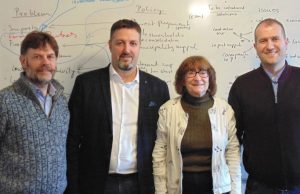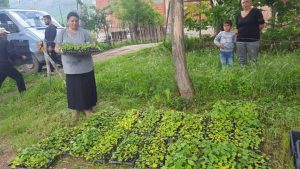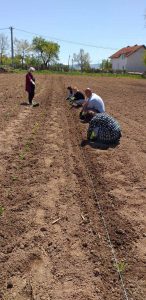Small family farms across the globe are in need of support, in poor countries such as Kosovo the critical need is to assist them to access markets, increase income and mitigate poverty.
Sophia Davidova, Professor of European Agricultural Policy and Director of the Research Centre for European Agri-Environmental Studies at the School of Economics University of Kent, and a scientific expert assisting the European Parliament Committee on Agriculture and Rural Development began her research career focussing on large corporate farms, but quickly realised these were not in a paramount need of public policy support as they are well organised, established businesses which can thrive under the market conditions. Small farms however are problematic as there has been little information or data gathered regarding their needs, consequently they were inadequately addressed in agricultural policies even though 90% of the 570 million farms worldwide are family and the overwhelming majority small.

The Agricultural Census of the Republic of Kosovo carried out in 2014 (KAS, 2015) accounted for 130,436 agricultural households and individual businesses. The average size of agricultural holding is 3.2 ha, including nearly 60% of the holdings with a size up to 1 ha. Holdings with arable land between 0 and 0.5 ha are the most common – 35.3% of the total number of holdings. In the livestock sector, the average number of livestock units (LSU) per farm is 3. Thus, small farms/farm households are the prevailing producers in Kosovo which means that their productivity and sustainability are central to the performance of the overall Kosovo agriculture. Commercialisation of this group of farmers is hence crucial for rural economic growth, increased competitiveness of agriculture and improved quality of life of people in rural areas.
“Nothing will be achieved by simply giving farmers two more cows or a greenhouse, if they don’t have the skills to extract anything from the additional assets”

Through her research Davidova aims to improve policies to support small farms making recommendations to the UN Food and Agricultural Organisation (FAO) on providing systematic information on small farmers and assessment on how government policies affect their welfare. Together with Alastair Bailey of the School of Economics she proposed a new policy of start-up grants to the poorest farmers in Kosovo, and most importantly, grants which will not be disbursed unconditionally and by making them conditional it would encourage farmers to use the advisory service, to increase their market knowledge or skills training to increase business acumen.

Davidova’s research with Alastair Bailey highlights that in order to save the vitality of rural areas, where small farms reside, it is necessary to encourage young Kosovans to view these area as an attractive option for residence and employment. Currently a large proportion are leaving to work in the towns and cities – rural areas are losing the newly educated generation preventing modern development of the small farms. Davidova and Bailey took as example the EU LEADER Programme – an initiative to support rural development projects initiated at the local level in order to revitalise rural areas and create jobs. They transformed this experience into a new policy in Kosovo that will encourage Local Action Groups (LAG) to create projects which increase tourism, employment, and infrastructure, consequently reducing the pushed out migration of the younger generation which could impact on over 100,000 small family farms in Kosovo alone.

